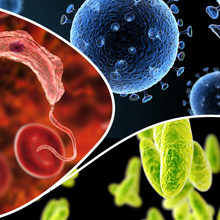New 'Feed the World' collection: open for submissions
12 March 2020

The Microbiology Society is excited to announce the launch of the new 'Feed the World' collection. This cross-journal collection will bring together content from across the Microbiology Society’s journal portfolio on the themes of food security, and agricultural and livestock pathogens that have an economic impact on humans and animals.
With the United Nations' resolution to eliminate world hunger by 2030 and the globe's population heading towards nine billion, the agriculture industry needs to increase livestock production from the same, or less, land. Livestock uses the most agricultural land (80% including grazing land and cropland for feed). Africa and Asia are the continents with the largest share of the world's uncultivated land; but attempts to develop and expand current capacity in order to meet the growing food demand are halted by deadly killers in the form of viruses, bacterial and protozoan parasites. As such, this area of research is hugely important to ensuring the availability of food for the world’s population.
Alison Mather from the Quadram Institute (UK) and Nigel French from Massey University (New Zealand), Guest Editors for Microbial Genomics, have said: “Ensuring the safety and security of our food supply presents one of the biggest challenges facing humanity. Advances in microbial genomics, coupled with new models of pathogen evolution and transmission are revolutionising our understanding of animal-, plant- and food-borne zoonotic pathogens, and the threat they present to food security. This, combined with innovative approaches to visualisation and interpretation, is aiding the design and implementation of effective interventions, and providing decision makers with the tools they need to stay ahead of the curve.
“The development of rapid, low-cost genomic and metagenomic sequencing will provide new opportunities to not only track microbial pathogens and antimicrobial resistance in near real-time through the food chain, but also to characterise the overall microbial communities on food and understand their impact on health and disease.”
Colin Crump from the University of Cambridge (UK), Reviews Editor for Journal of General Virology, said: “The security of food-chains is of vital importance as the global population continues to grow. Viral pathogens are significant threats to livestock farming and can cause devastating losses if unchecked. This timely collection of primary research and review articles will help raise awareness and promote new scientific endeavours to address the many current and future challenges of viral diseases in livestock.”
Sharon Brookes from the Animal Plant Health Agency (UK), Guest Editor for Journal of Medical Microbiology, said: "Plant, environment, animal and human health and welfare are all interconnected via the ‘One Health’ ethos, contributing to the UN Sustainable Development Goals for the future. Safe and good-quality food (humans) and feed (animals) are essential to bridge the gaps for global sustainable ambitions. Food and feed security limits the impact of detrimental pathogens whilst maintaining beneficial microbes many of which are necessary for life (microbiomes) and contribute to nutrition and food quality. The Society’s ‘Feed the World’ collection aims to provide a cross-cutting space for microbiologist to contribute to this theme."
Guest-edited by a series of expert microbiologists, this collection welcomes submissions from across the breadth of microbiology, including genomics-led research analysing evolution, epidemiology and transmission of agricultural pathogens, and developments in the understanding of viral pathogens.
The deadline for the submissions is 30 June 2020 and authors wishing to be considered for the collection should submit their manuscript to the online submission system for the most relevant journal, indicating in their cover letter that the manuscript it is intended for the Feed the World collection.


